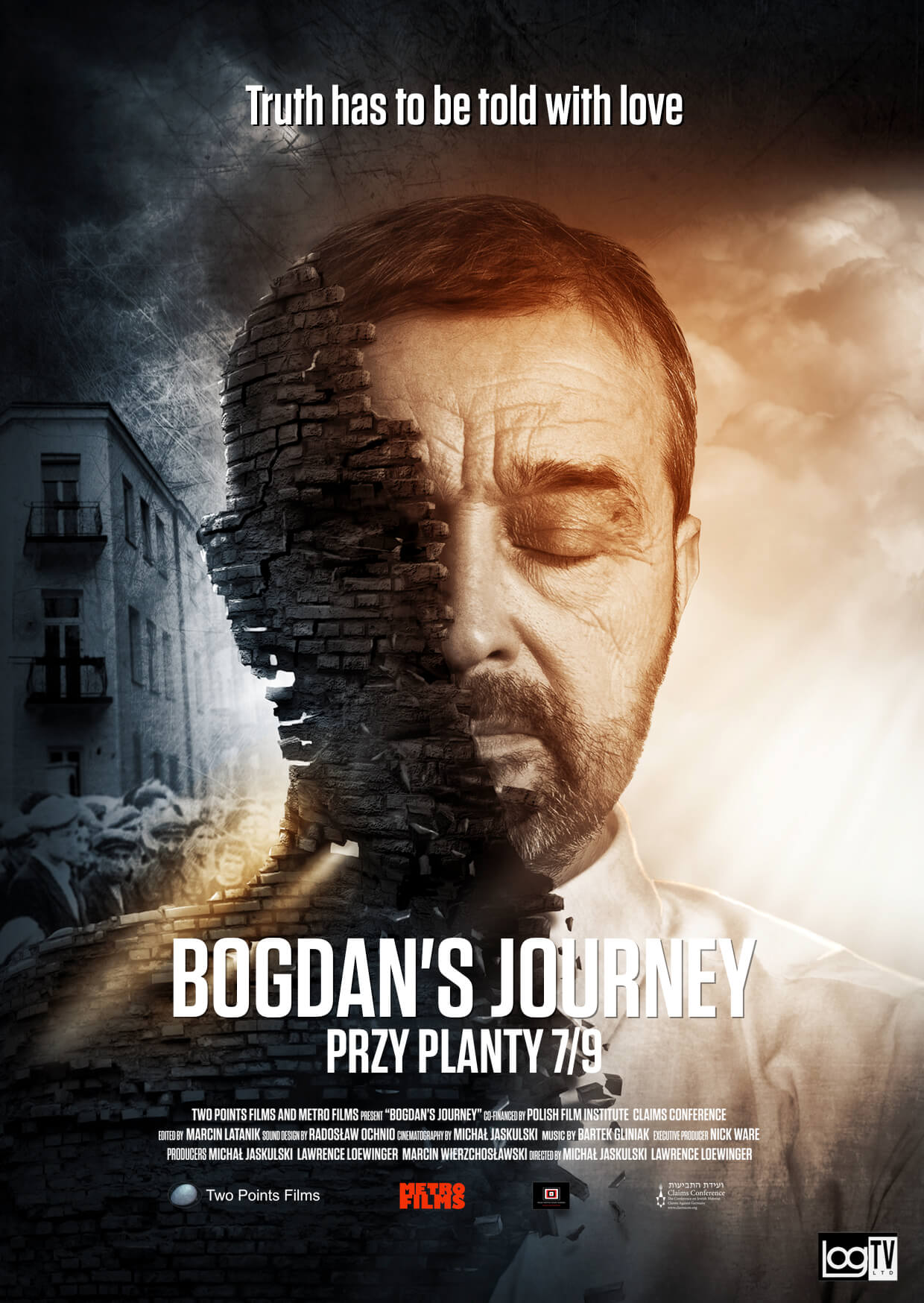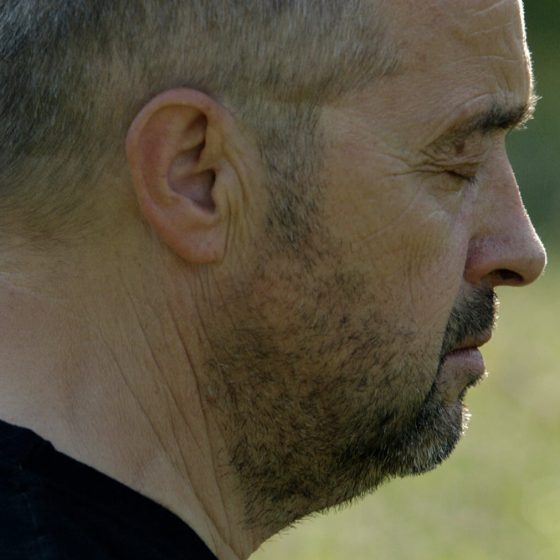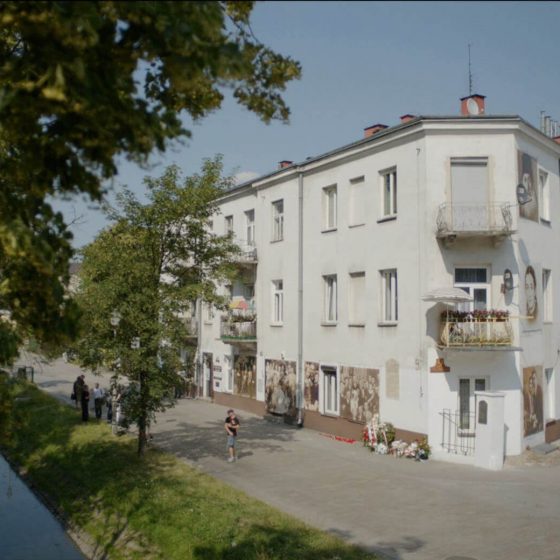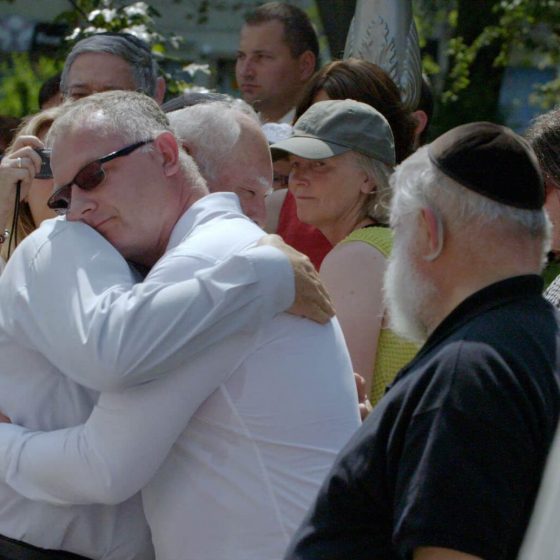Bogdan’s Journey
Kielce, Poland was the site of Europe’s last Jewish pogrom in 1946. The militia, soldiers and ordinary townspeople killed over 40 Holocaust survivors seeking shelter in a downtown building, injuring 80 more. As news of the pogrom spread across Poland, Jews fled the country. The Kielce pogrom became a symbol of Polish post-war anti-Semitism in the Jewish world. Under communism, the pogrom was a forbidden subject in Poland, but it was never forgotten. Read more below.
ABOUT FILM
CREDITS
REVIEWS AND REACTIONS
SCREENINGS AND AWARDS
FILM POSTER
ABOUT FILM
Kielce, Poland was the site of Europe’s last Jewish pogrom in 1946. The militia, soldiers and ordinary townspeople killed over 40 Holocaust survivors seeking shelter in a downtown building, injuring 80 more. As news of the pogrom spread across Poland, Jews fled the country. The Kielce pogrom became a symbol of Polish post-war anti-Semitism in the Jewish world. Under communism, the pogrom was a forbidden subject in Poland, but it was never forgotten.
In a free Poland, Bogdan Białek, a Catholic Pole, journalist and psychologist, emerges to talk publicly about the issue. Over time, with great effort, he persuades the people of Kielce to confront this painful history. Beginning as a solitary figure, he confronts the deepest prejudices in his fellow citizens, and strives to reconnect Kielce with the outside Jewish community. The effort costs him dearly. Bogdan’s Journey was filmed in Poland, Israel and the United States for almost a decade. Its two directors, a Polish Catholic and a Jewish American, combine to tell a unique story about one man and how he redeems 70 years of bitter, contested memories–by telling the truth with love.
Duration: 1 hour 26 minutes
Languages: Polish, English; English Subtitles
CREDITS
Directed by:
Michał Jaskulski & Lawrence Loewinger
Photography:
Michał Jaskulski
Music:
Bartek Gliniak
Producers:
Michal Jaskulski, Lawrence Loewinger & Marcin Wierzchoslawski
Production Company:
Two Points Films & Metro Films
Distributor:
LOGTV, Ltd
REVIEWS AND REACTIONS
On the site of a 1946 massacre, a Catholic Pole works to heal his home
The Times of Israel, 31 March 2017
It was a “moral reflex” that inspired Bogdan Bialek to speak out about the Kielce pogrom, he told the audience after a Southwest Florida-screening of the new documentary “Bogdan’s Journey.” The film chronicles his mission to heal his home of Kielce, Poland, through education and acceptance.
A Catholic Pole, Bialek may not be the most likely advocate for victims and survivors of the 1946 pogrom. The outbreak of violence in the small city of Kielce killed more than 40 Jews, most of them Holocaust survivors. He has, however, been the most dedicated one.
Get The Times of Israel’s Daily Edition by email and never miss our top stories FREE SIGN UP
Directors Michal Jaskulski and Lawrence Loewinger spent more than 10 years creating their film about Bialek and his work, which received a standing ovation from the opening night crowd at the 2017 Jewish Film Festival of Sarasota-Manatee on March 12.
“When something evil happens, you have to do something about it,” Bialek said after the screening.
Bialek, a magazine publisher, moved to Kielce from a city near the Belarussian border in 1978. He was aware of the pogrom when he arrived, but he was met with resistance when he discussed it. That is why, for decades, Bialek has dedicated his life to encouraging the people of Kielce to acknowledge the atrocity that took place there, and to admit that the Polish public played a role in it.
Kielce pogrom: The battle over memory
New Eastern Europe, February 15, 2018
Interview with Michal Jaskulski, co-director of the documentary “Bogdan’s Journey”.
Interviewer: Paul Toetzke.
PAUL TOETZKE: Your film Bogdan’s Journey talks about the pogrom in Kielce in 1946, in which more than 40 Jewish Holocaust survivors were killed. It therefore touches upon quite a sensitive topic. Why is it still so hard for the Polish people to face this chapter of their history?
MICHAŁ JASKULSKI: The problem in Poland is that we have never really had good education about the Holocaust and its aftermath. It is very basic and informal. As our protagonist says, “in our talks about Poles and Jews there is no compassion, no regret, no sorrow.” It is easy to blame others for our scars. But we never looked at what the Holocaust did to Poles -– not as a nation but as people. None of us living today is able to answer how religion, social considerations and the terror would have shaped us. We have not learned this sensitivity yet. This is why the debate often ends up with attacking and defending. In a way, the conversation about this difficult past begins with your own attitude.
Kielce: The Post-Holocaust Pogrom That Poland Is Still Fighting Over
Smithsonian.com, January 8, 2018
After World War II, Jewish refugees found they could never return to their native land—a sentiment that some echo today.
The massacre started with a blood libel. That wouldn’t be unusual, except this wasn’t the Middle Ages or even Nazi Germany—it was 1946, a year after the end of World War II.
A few days earlier, an 8-year-old Polish boy named Henryk Błaszczyk had gone missing from his home in Kielce, Poland, a city of 50,000 in southeastern Poland. When Henryk reappeared two days later, he told his family he had been held by a man in a basement. As his father walked him to the police station to recount his story, the boy pointed at a man who was walking near the large corner building at 7 Planty Street.
He did it, Henryk said.
SCREENINGS AND AWARDS
AWARDS
BOGDAN’S JOURNEY is the winner of GRAND PRIX – Jewish Motifs IFF 2017 Best Polish Film – Jewish Motifs IFF 2017 Audience Choice Award – Jewish Motifs IFF 2017 Camera of David Special Award at Warsaw Jewish Film Festival 2016 Interfaith Awards Best Documentary at St. Louis International Film Festival 2016 Best Documentary Award at Jersey City International Television and Film Festival 2016 It has been screened at the prestigious CAMERIMAGE International Film Festival in Poland (2016), the Millenium Docs Against Gravity (2016) and Watch Docs – Human Rights in Film 2016.
SCREENINGS
USA
• Jersey City International Television and Film Festival
• Austin Jewish Film Festival
• St. Louis International Film Festival
• Maine Jewish Film Festival
• Chicago Jewish Film Festival
• Westchester Jewish Film Festival
• Baltimore Jewish Film Festival
• Gainesville Jewish Film Festival
• Berkshire Jewish Film Festival
• Southampton Jewish Film Festival
CANADA
• Vancouver Jewish Film Festival
• Toronto Jewish Film Festival
DENMARK
• Copenhagen Jewish Film Festival
IRELAND
• Galway Film Fleadh
SPAIN
• Medimed
• Espacio Enter Canarias
GERMANY
• Neisse Film Festival
NIGERIA
• Real Time Film Festival
GRECE
• AegeanDocs International Film Festival
HONG KONG
• Hong Kong Jewish Film Festival
GREAT BRITAIN
• UK Jewish Film Festival
POLAND
• Docs Against Gravity International Film Festival
• Camerimage Festival
• Watch Docs Human Rights in Film
• Festival Form Dokumentalnych NURT
• Warsaw Jewish Film Festival
• Jewish Motifs International Film Festival
FILM POSTER
